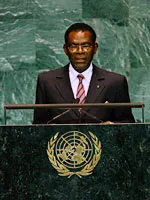Statement
Statement summary
TEODORO OBIANG NGUEMA MBASOGO, President of Equatorial Guinea said that the economic crisis created global instability and threatened world peace. In such a climate of insecurity, compounding crises such as food shortages, natural disasters, and climate change issues, to name a few, challenged the United Nations. However, he continued, to formulate effective responses to the economic and financial crisis, Member States needed to be encouraged to "rein in their actions" that affected weaker and poorer countries.
He observed that the end of the cold war made it possible for a more global world to emerge, one with more justice and better relationships between countries. Since then, mutual respect for different cultures and shared responsibilities remained the fundamental basis for cooperation between nations and was the guiding principle of the United Nations. However, the gap between developed and underdeveloped countries had widened, despite the many resolutions and recommendations adopted by the General Assembly. A replacement of the old economic order was needed, to create a fairer and more equitable system with financial assistance to weak and more vulnerable countries through special summits and globalized trade. Even with all the initiatives in recent years, only 20 per cent of the Millennium Development Goals had been met.
Stating that Equatorial Guinea welcomed debate about the global crisis, he called for a redefinition of positions in regard to global development, in order to resolve what he saw as problems stemming from the conflicts driven by wealthy countries to the detriment of poor countries. When a collapse of balance and a lack of multilateral collaboration occurred, "the result could be nothing but a cold or a hot war" and he called for new global approaches to enhance an equitable contribution. Through strengthened intercultural dialogue, these new strategies would support the original philosophy of the United Nations.
He went on to discuss Equatorial Guinea's excellent ties and friendship through economic cooperation, not just with all its regional neighbours of Central Africa, but with all countries that contributed to global peace and economic development through use of Equatorial Guinea's natural resources and oil, in particular its partners in Europe, Africa, the Americas and Asia. However, he was astounded by what appeared to be envy of his country's oil resources. These resources had been made available to the international community, and yet Equatorial Guinea became the target of attacks, invasions, and attempts at destabilization in what clearly was an aim to gain control of resources that belonged solely to his country. He stated that Equatorial Guinea was a peaceful country committed to the United Nations Charter. It sought to maintain non-violence negotiations and engage in dialogue for disputes at international tribunals.
He concluded by saying that global peace was a universal right of all people and a prerequisite for the survival of humankind. Global crises affected global peace, as seen in recent conflicts in different States of the world. The United Nations was created for peace, and for the sake of global peace, he called upon the international community to be prudent and not allow injustice to stoke crises between nations.
Full statement
Read the full statement, in PDF format.
Photo

Previous sessions
Access the statements from previous sessions.
